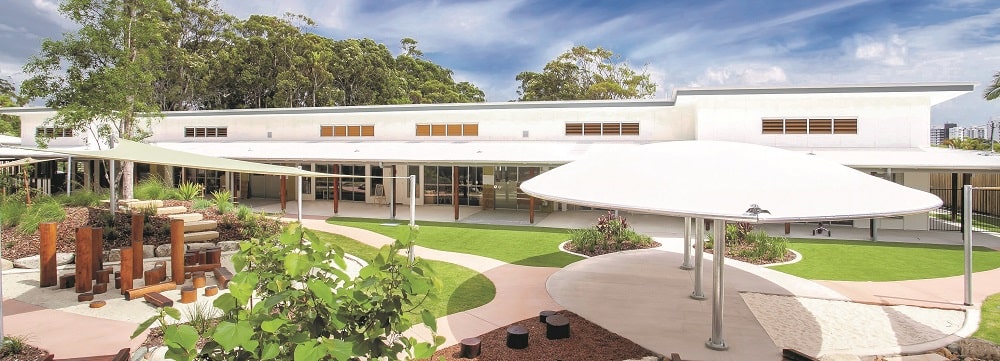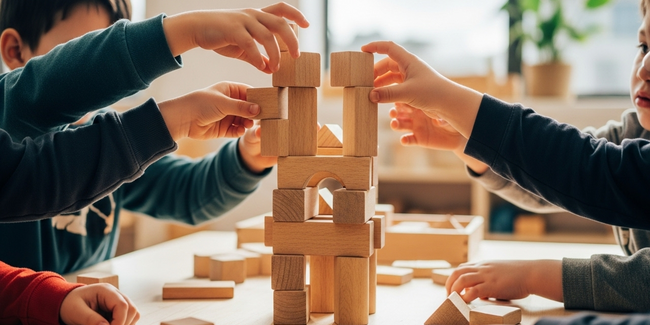Watching your toddler snatch a toy or your preschooler struggle to join a game is tough for any parent. You ask yourself, ‘Are they learning to get along?’ It’s the number one social development question we hear from Sunshine Coast families. The answer is more complex—and more reassuring—than you think.
True social skill isn’t just about forced sharing or saying “please.” It’s about learning to see from another’s perspective, to solve problems together, and to build the foundations of empathy and resilience. With over 15 years of experience in early childhood management, we know that guiding children from conflict to collaboration is one of the most critical roles we have as educators.
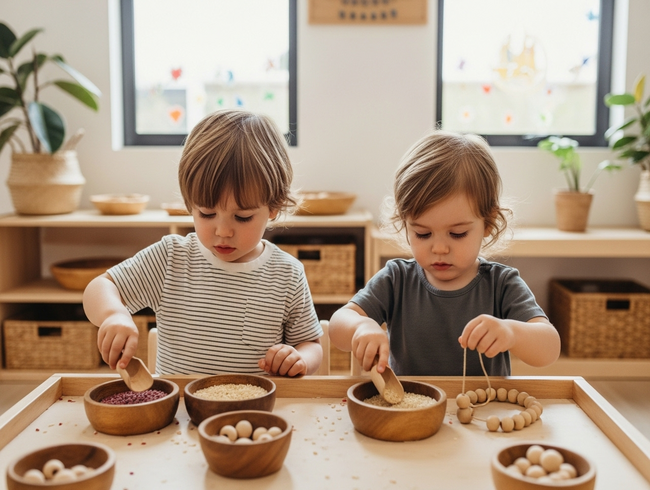
This is our expert, evidence-based framework for intentionally building these skills. It’s an approach that is deeply embedded in our curriculum, guided by the National Quality Standards, and uniquely amplified by our natural Sunshine Coast environment. We don’t just hope for friendships to happen; we thoughtfully cultivate the conditions for them to grow.
The Social Roadmap: Why Your Toddler Isn’t ‘Being Naughty’
One of the greatest anxieties for parents is wondering if their child’s behaviour is “normal.” When a two-year-old plays happily beside another child but not *with* them, or a three-year-old declares everything “Mine!”, it’s easy to worry.
The truth is, these behaviours aren’t signs of a social deficit; they are vital signposts on a predictable developmental journey. The Early Years Learning Framework (EYLF) helps us understand this progression. Instead of seeing these moments as problems to fix, we view them as opportunities to guide. At Okinja, our educators are developmental cartographers, expertly mapping and supporting each child’s unique social journey through distinct phases of play.
1. Solitary Play: The Solo Explorer (Typically under 2)
A young toddler engrossed in stacking blocks alone is not being antisocial; they are a focused scientist discovering gravity, texture, and cause and effect. This independent exploration is the bedrock of all future learning, building concentration and self-reliance.
2. Parallel Play: The Side-by-Side Apprentices (Typically 2-3 years)
This is the stage that causes the most confusion. Imagine two artists in a studio, working on separate canvases but keenly aware of each other. One might start using more blue paint after seeing their neighbour do so. This is parallel play. Children play *alongside* each other, not *with* each other. They are learning social cues, observing behaviours, and building comfort with peers without the pressure of direct interaction. It is a crucial, non-negotiable bridge to more complex play, and we protect and encourage this vital phase.
3. Associative Play: The Shared Story Begins (Typically 3-4 years)
Here, interaction blossoms. Children might share materials for a sandcastle, but one is building a tall tower while another builds a long wall. They are engaged and communicating, but their end goals are not yet unified. This is where the first real negotiations over resources happen, providing rich soil for us to begin teaching problem-solving and turn-taking.
4. Cooperative Play: The Project Team (Typically 4+ years)
This is the ultimate goal. A group of children decide, “Let’s build a den together!” There’s a shared goal, roles are assigned (“You get the long sticks, I’ll find the palm fronds”), rules are negotiated, and the success is collective. This requires advanced communication, emotional regulation, and empathy—the very skills essential for a successful transition to Prep and for life.
Understanding this roadmap allows us to meet children exactly where they are, providing the right support at the right time, never pushing them into social situations they are not yet equipped to handle.
The Educator’s Toolkit: Intentional Strategies for Fostering Cooperative Play
Creating a socially adept child isn’t about a list of activities; it’s about the intentional strategies woven into every moment of their day. Our approach is grounded in meeting the high standards of ACECQA’s Quality Area 5 (Relationships with Children) and Quality Area 3 (Physical Environment).
For Our Toddlers: Building the Foundation
In our toddler rooms, you won’t see educators forcing a child to hand over a toy. Instead, you’ll see a carefully orchestrated environment designed to minimise conflict and maximise positive interaction.
- Designing for Abundance: We create “resource-rich zones.” Instead of one coveted trike, there are several. The sandpit has multiple buckets, funnels, and spades. By ensuring an abundance of engaging materials, we reduce the primary trigger for toddler conflict, allowing them to focus on observing and enjoying the company of their peers during parallel play.
- Sportscasting, Not Refereeing: When a dispute does arise, our educators act as “sportscasters.” We don’t jump in to solve it; we narrate the situation to help children build emotional literacy. “Leo, I see you are holding the blue truck. Chloe, you look sad because you would like a turn.” This validates both children’s feelings without blame and is the first step in teaching them to recognise emotions in others.
- Introducing ‘My Turn, Your Turn’: We use visual timers, songs, and simple language to introduce the concept of turn-taking. This concrete, predictable process respects a toddler’s deep need for focus while gently teaching the rhythm of social give-and-take. It’s a far more effective and respectful strategy than the abstract demand to “share.”
For Our Preschoolers: Constructing Collaboration
As children move into our Kindergarten rooms, our Bachelor-qualified Teachers shift the focus from turn-taking to true, collaborative problem-solving. This is where we deliver the guidance other centres often miss: we actively use conflict as a powerful curriculum moment to develop preschool social skills.
- Engineering Collaborative Challenges: We pose problems that simply cannot be solved alone. These aren’t just group activities; they are authentic challenges. How can we get water from the tap to the far end of the garden bed using only short pipes? How can we create a stage big enough for three performers using only the wooden blocks? The goal itself requires teamwork, making cooperation the only path to success.
- The Conflict Resolution Corner: Instead of a “naughty corner,” we have a calm space where an educator guides children through a conflict. We equip them with language: “Can you tell me what happened?” “How did that make you feel?” “What could we do differently next time so you both feel happy?” We are not just stopping a fight; we are teaching negotiation, empathy, and self-advocacy, directly addressing the core competencies of Quality Area 5.
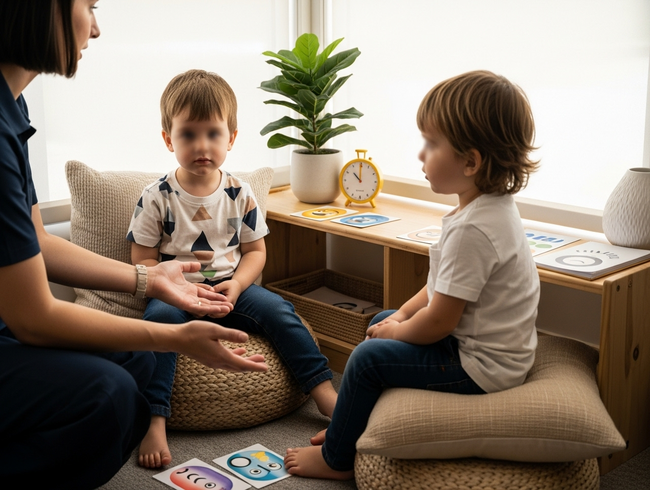
The Okinja Difference: Where Nature is the Ultimate Social Teacher
While these strategies are effective in any environment, their power is magnified tenfold in our unique setting adjacent to the Alex Forest Bushland Park. Our Bush Kindy program is not just a novelty; it is a core component of our social-emotional curriculum. The natural world is the ultimate teacher of cooperation.
A classroom is filled with finite, purpose-built toys. There might be five red blocks, and when they’re gone, they’re gone—a natural setup for conflict. The bush, however, offers infinite, open-ended resources. A fallen branch isn’t just a branch; it’s a bridge, a balance beam, a wall for a fort, or a magical wand. This inherent flexibility dramatically reduces disputes over “things” and instead sparks limitless imaginative play that children are eager to share.
This is what that looks like in practice:
- Shared Purpose: Three children cannot move a large, fallen log on their own. To build the shelter they have envisioned, they must communicate, plan their strategy, and physically work together. The problem is real, the goal is shared, and the sense of collective achievement is profound. This experience builds more resilience and teamwork skills than a hundred contrived indoor activities.
- Natural Problem-Solving: When children decide to build a dam in a creek bed, they must negotiate who will gather rocks, who will place them, and how to stop the leaks. The environment gives them immediate, natural feedback on their efforts, encouraging them to adapt their strategy as a team.
- Cultivating Shared Wonder: Watching a line of ants march across a path, or discovering a dragonfly resting on a leaf, creates a moment of shared awe. These quiet, observational moments build connection and a sense of belonging to something larger than oneself. It’s in these moments that children learn to talk with each other, not just at each other.
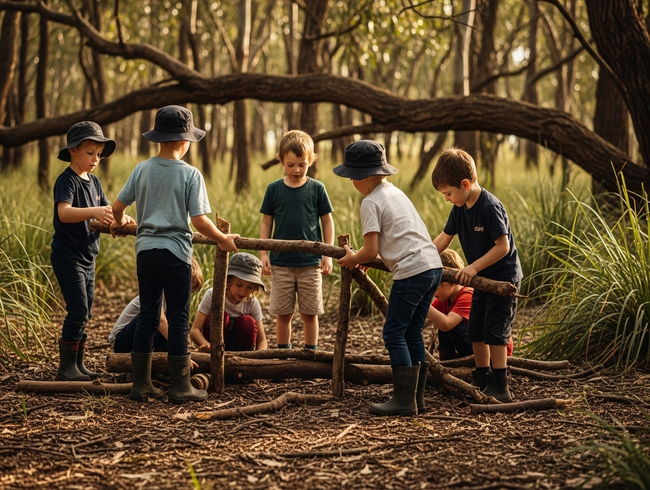
Our role in this natural classroom is not as instructors, but as facilitators of discovery. We pose questions that deepen the learning—”What do you think will happen if we put the heavy rocks at the bottom?”—and ensure every activity is conducted within our rigorous safety protocols, allowing children the freedom to explore and collaborate with confidence.
Your Partners in Nurturing a Socially Confident Child
Helping a child learn to play, negotiate, and collaborate is a journey, not a race. It unfolds in predictable stages, and it thrives with expert, intentional guidance.
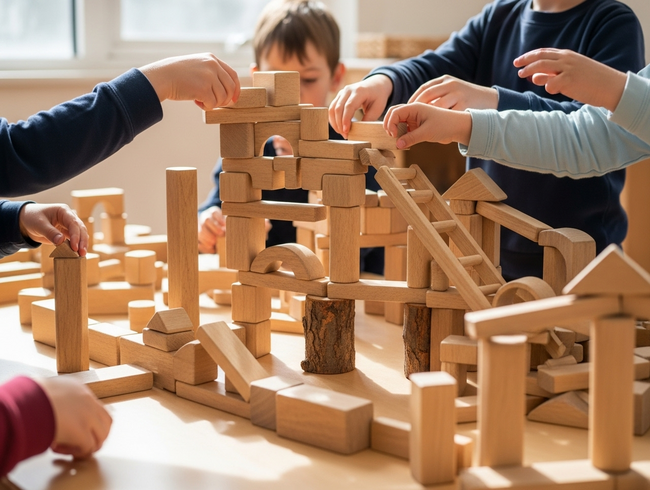
At Okinja, we are committed to being your expert partners in this process. Our approach is built on decades of experience and a deep understanding of child development, as outlined in the Early Years Learning Framework. We meet and exceed the National Quality Standards not as a checklist, but as a promise to your family that we are providing an environment where your child can flourish emotionally and socially.
We build these essential life skills not by forcing them, but by creating a culture of respect, providing the language for empathy, and using our incredible natural environment to present real, engaging opportunities for teamwork. We are preparing your child for Prep and for life, by teaching them how to solve problems not just with blocks, but with branches, ingenuity, and a helping hand.
If you’d like to discuss your child’s specific needs with our experienced, Bachelor-qualified educators, we invite you to book a tour and witness how our children are building the foundations of friendship, resilience, and empathy, every single day. Contact Okinja Early Learning Centre today on 07 5479 2222 to see how our expert-led approach can support your child’s journey.
